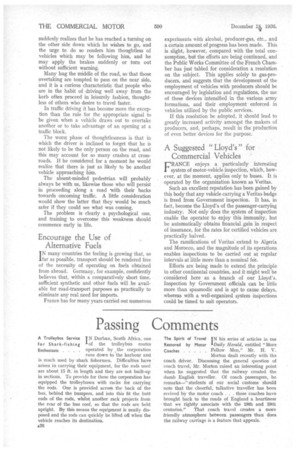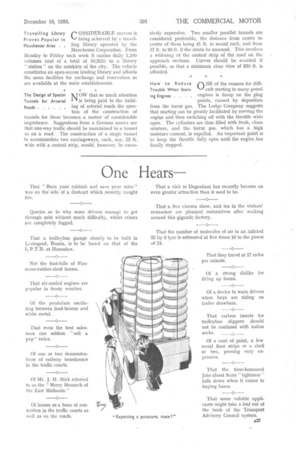Passing Comments
Page 28

Page 29

If you've noticed an error in this article please click here to report it so we can fix it.
Trolleybus service IN Durban, South Africa, one forS h a rk-f ishing L0f the trolleybus .routes Enthusiasts . . . operated by the corporation runs down to the harbour and is much used by shark fishermen. Difficulties have arisen in carrying their equipment, for the rods used are about 15 ft. in length and they are not built-up in sections. To provide for these the corporation has equipped the trolleybuses with racks for carrying the rods. One is provided across the back of the bus, behind the bumpers, and into this fit the butt ends of the rods, whilst another rack projects from the rear of the bus roof, so that the rods are held upright. By this means the equipment is neatly disposed and the rods can quickly be lifted off when the vehicle reaches its destination.,
£26
IN his series of articles in the tDaily Herald, entitled "More Fellow Men," Mr. H. V. Morton dealt recently with the coach driver. Discussing the general question of coach travel, Mr. Morton raised an interesting point when he suggested that the railway created the dumb English traveller. Of coach passengers, he remarks—" students of our social customs should note that the cheerful, talkative traveller has been revived by the motor coach . . . these coaches have brought. back to the roads of England a heartiness that we rightly associate with the 18th and 19th
centuries." That coach travel creates a more friendly atmosphere between passengers than does the railway carriage is a feature that appeals. The Spirit of Travel Restored by Motor Coaches
Travelling Library Proves Popular in Manchester Area . . CONSIDERABLE success is being achieved by a travelling library operated by the Manchester Corporation. From
Monday to Friday each week it carries daily 1,200 volumes (out of a total of 10,325) to a library " station " on the outskirts of the city. The vehicle constitutes an open-access lending library and affords the same facilities for exchange and reservation as are available at the main establishments.
The Design of Special -NT OW that so much attention
Tunnels for Arterial is being paid to the buildRoads. . . . . . ing of arterial roads the ques
tion of the construction of tunnels for these becomes a matter of considerable importance. Suggestions from a German source are that one-way traffic should be maintained in a tunnel as on a road. The construction of a single tunnel to accommodate two carriageways, each, say, 23 ft. wide with a central strip, would, however, be execs sively expensive. Two smaller parallel tunnels are considered preferable, the distance from centre to centre of these being 41 ft. in sound rock, and from 57 ft. to 66 ft. if the strata be unsound. This involves a widening of the central strip of the road on the approach sections. Curves should be avoided if possible, so that a minimum clear view of 330 ft. is afforded.
How to Reduce r. NE of the reasons for diffi
Trouble When Startcult starting in many petrol ing Engines . . . engines is damp on the plug
points, caused by deposition from the burnt gas. The Lodge Company suggests that starting can be greatly facilitated by revving the engine and then switching off with the throttle wide open. The cylinders are thus filled with fresh, clean mixture, and the burnt gas, which has a high moisture content, is expelled. An important point is to .keep the throttle fully open until the engine has finally stopped.




















































































